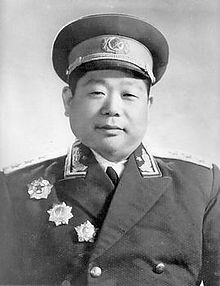Chen Xilian
Chen Xilian ( Chinese 陳錫聯 / 陈锡联 , Pinyin Chén Xīlián ; * 1913 or 1915 in Hong'an County , Hubei ; † 1999 in Beijing ) was a Chinese general, politician and minister.
Chen was born into a poor farming family. He joined the Communist Youth League in 1929 and the Communist Party in 1930 . In the 1930s he was political commissar in several units of the Chinese Red Army . Under the leadership of Lin Biao and Liu Bocheng , he rose through the ranks of the army. After the Red Army had to evacuate their base areas , Chen took part in the Long March . In the war of the communist army against Japan , Chen served first as regimental commander, later as brigade and column commander. Among other things, he led a successful attack on the Japanese-held Yangmingbao airfield in 1937, which eliminated the danger of Japanese bombing for the communist troops. In the civil war against the nationalist army of the Kuomintang , he took part in the Huaihai campaign and in the crossing of the Yangtze River .
After the proclamation of the People's Republic of China, Chen first served as the first party secretary and mayor in the city of Chongqing . He then became commander of the People's Liberation Army in Sichuan Province , later commander of the artillery of the People's Liberation Army. In 1955 he was promoted to general. From 1957 to 1973, Chen was the commander of the Shenyang military region , a particularly sensitive area at the time due to the latent conflict with the Soviet Union . After the fall of Peng Dehuai , he also became party secretary of the Northeast Office of the Communist Party. During the Cultural Revolution , Chen became Chairman of the Liaoning Province Revolutionary Committee and Liaoning Province Party Secretary. In 1969 he was promoted to the Politburo of the Communist Party . After the alleged attempted coup by Lin Biao, Chen was the first general in the People's Liberation Army to distance himself from Lin.
In 1974 he was brought to Beijing, where he initially took over the post of commander of the Beijing military region . He became Deputy Prime Minister in January 1975 and a month later he became a member of the Central Military Commission . In February 1976, he replaced Ye Jianying as General Secretary of the Central Military Commission and took over the post of Defense Minister of the People's Republic of China .
After the end of the Cultural Revolution and the death of Mao Zedong , Chen lost his post in the Politburo: After taking the side of the ultra-left in the Communist Party during the Cultural Revolution, Deng Xiaoping brought him in - he had been demoted twice, but was now in fact governing the People's Republic - no benevolence towards it. In 1982 he became a member of the Central Advisory Commission , which was essentially a forum for former senior party and government officials.
Web links
Individual evidence
- ↑ a b c d e Lawrence R. Sullivan: Historical dictionary of the Chinese Communist Party . Scarecrow Press, Lanham 2012, ISBN 978-0-8108-7470-1 , pp. 303-305 .
- ↑ a b c d e Xiaoxiao LI: Chen Xilian . In: Xiaobing Li (Ed.): China at War - An Encyclopedia . ABC-CLIO, 2012, ISBN 978-1-59884-416-0 , p. 34-35 .
- ^ A b c Guo Jian, Song Yongyi and Zhou Yuan: Historical dictionary of the Chinese cultural revolution . Rowman & Littlefield, Lanham 2015, ISBN 978-1-4422-5171-7 , pp. 56 .
| personal data | |
|---|---|
| SURNAME | Chen Xilian |
| ALTERNATIVE NAMES | Chén Xīlián; 陈锡联; 陳錫聯 |
| BRIEF DESCRIPTION | Chinese general and minister |
| DATE OF BIRTH | 1913 or 1915 |
| PLACE OF BIRTH | Hong'an , Hubei |
| DATE OF DEATH | 1999 |
| Place of death | Beijing |

